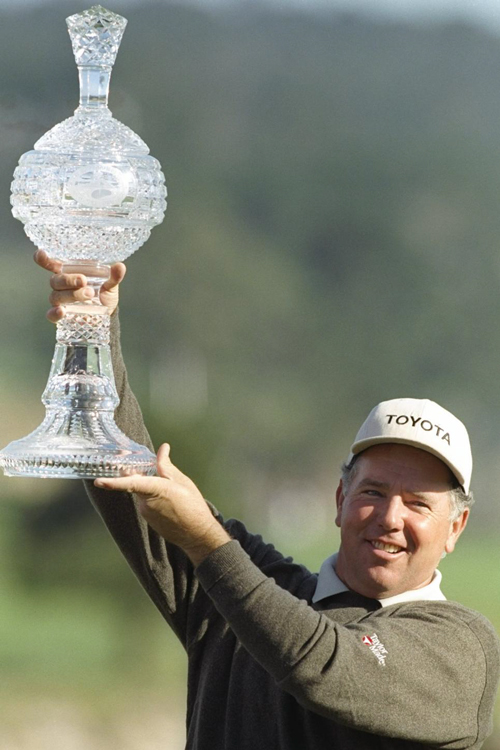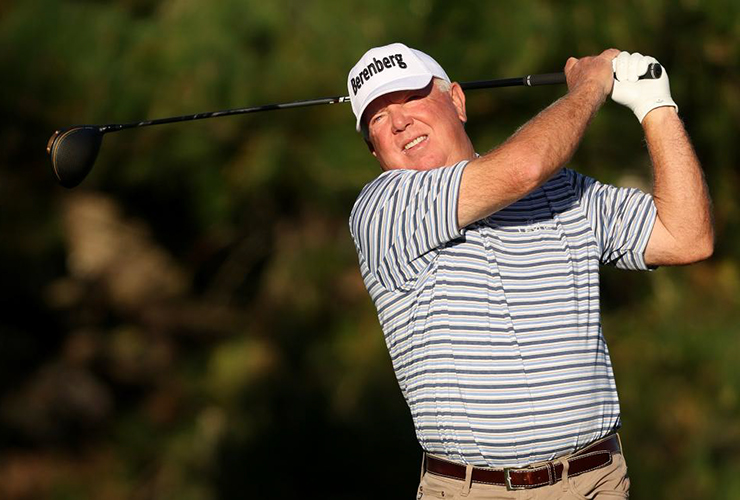Nothing against the 20-foot birdie putt he knocked in on the 72nd hole to win the Masters in 1998.
Or the victory three months later in The Open at Royal Birkdale in a four-hole playoff over Brian Watts.
They were huge, life-changing, really, and, to many, unexpected, coming at the age of 41—but mention Mark O’Meara and one spot on the planet comes to mind, Pebble Beach, where he won a record five times (tied with Phil Mickelson) from 1985 through 1997, as well as the California State Amateur in 1979.
No wonder that O’Meara, 67, has decided to make Pebble and the PURE Insurance Championship on PGA Tour Champions that gets underway Friday the end of his career.
And, yes, the 16-time PGA Tour champion and three-time senior winner means the end.
“I’m not going to take a spot from another player, and I’m not going to compete anymore,” O’Meara said in a recent interview with Golf Digest. “I just don’t want to be a ceremonial golfer and I’ve kind of been somewhat of that.”
For O’Meara and Pebble, it was a love affair from the start, and it’s not solely because of the success he’s enjoyed. “Even to this day,” O’Meara said, “I have never seen a more spectacular place than the [Monterey] peninsula.”
The triumph in 1979 Cal Am while he was a senior at Long Beach State may be the most significant of all. At 22, the future was bright but uncertain.
“That was kind of the springboard,” O’Meara said. “The magnitude of that event gave me some confidence to play well the rest of the summer.” His run included victories in the Southwest Amateur, Mexican Amateur, and, ultimately, the U.S. Amateur at Canterbury Golf Club outside Cleveland, where he defeated his friend and defending champion John Cook 8 and 7.

Mark O”Meara celebrates winning the 1997 title at Pebble Beach – Andy Lyons
In 1984, O’Meara, the Rookie of the Year in 1982, made his first run for a title at Pebble, finishing in a tie for third. All was not lost, however. He and his amateur partner, J.P. Diesel, a Texas oil executive, won the pro-am with a best-ball score of 31 under.
Which brings us to one of the reasons O’Meara has done so well at this event.
Other pros may complain about the near six-hour rounds or watching one horrific amateur shot after another. Not O’Meara.
“I try to engage with the people I’m with,” he said, “and I used that as an out to not be so much worried about exactly what I was doing all the time.” Instead of being a distraction,
O’Meara went on, “I looked at it as a benefit for me.”
No experience was more beneficial than when his partner was his father, Bob, who was in the furniture business. “When you can play alongside your father in a PGA Tour event, it was pretty amazing,” he said.
In 1986, their first time together at Pebble—Bob O’Meara played to about a 14 then—they made the cut. The second time, in 1990, they did better than making the cut. They won the darn thing.
On the 72nd hole, the elder O’Meara hit first. Into the Pacific. “That wasn’t a good time to hit one like that,” he told his son.
“No, dad.”
O’Meara, leading the tournament, found the fairway. And then he found a way to keep his father from being in the way heading home.
“What do you want me to do?” Bob O’Meara said as they walked down the fairway. “You know, dad, all I have to do is par this hole and I win the tournament and we can celebrate,” his son responded. “Put your ball in your pocket and just walk up the left side and take this all in and enjoy the moment.”
His father didn’t object: “That’s the best damn advice you’ve given me all week long.”
O’Meara, the defending champion—he outdueled Tom Kite by one in 1989—finished off with a birdie to beat Kenny Perry by two. The two O’Mearas hugged. “That’s one of the highlights of my career, by far,” Mark said.
Two years later, O’Meara won for the fourth time at Pebble, defeating Jeff Sluman on No. 16, the first playoff hole. O’Meara, who had rallied from a four-shot deficit after a double on the treacherous eighth hole, made a 15-footer for par while Sluman missed from 12 feet.
“Right when I hit it, I thought I pulled it a little bit,” O’Meara said, “and then it started bouncing to the left and then bouncing back to the right, and it goes in. I look over at Jeff and I kind of apologise, and he’s like, ‘Hey, I get it, you always win at Pebble Beach.’”
The last victory came in 1997, by a stroke over Tiger Woods and David Duval. “It was electric out there,” O’Meara said, “because Tiger Woods was making birdies. You know the Tiger roar on the course, and I know it very well.”
Most players would have been intimidated. Not O’Meara, who had become a good friend.
On the 17th green on Sunday, facing about a 16-footer for birdie, he watched Woods get ready to hit his second shot on 18. “He knocks it on the green in two,” recalled O’Meara, who was up by two. “I thought to myself, ‘He’s going to make eagle, so I need to make this birdie putt.’”
Which he did. The win meant a lot, though it wasn’t “as good as when I played with my father.”
O’Meara expects to be emotional this week at Pebble. No matter what happens. Just because he’s ready to leave the stage doesn’t mean the finality of it all won’t hit him.
Since the tournament will have a cut—top 50 and ties—he’s been told already that he’ll play Pebble on day two, and not Spyglass Hill, the other course used for the event, just in case that it will, indeed, be his final round as a professional golfer.
“If I play well, great. If I don’t, great,” he said.
O’Meara referred to articles which mention that while he has won 16 times on tour, five of them were at Pebble Beach.
“Most people would die to win one time at Pebble,” he said.
Main Image: Ezra Shaw









